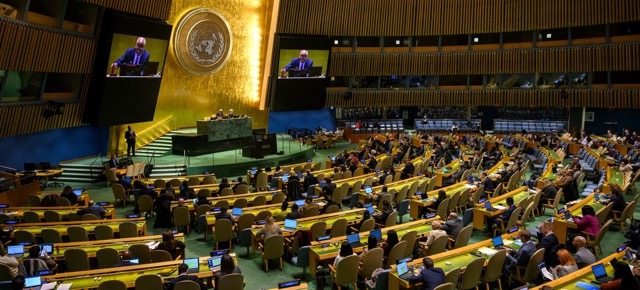The United Nations General Assembly adopted the UN Convention against Cybercrime on December 24, 2025. NCMEC convened survivor consultants and contributed input to the office of the President of the United States for consideration in advance of the General Assembly’s action on the Convention.
The General Assembly’s adoption of the Convention is one of several steps remaining before the Convention comes into force. A formal signing ceremony will be hosted in Vietnam in 2025; once the Convention has been ratified by 40 Member States, it will become effective.
Without taking a position on other aspects of the Convention, NCMEC has noted that Articles 14, 15, and 16 include provisions that—if adopted and enforced by Member States—would improve global responses to online child sexual exploitation. In a letter accompanying feedback collected from survivor consultants, NCMEC CEO Michelle DeLaune wrote:
Article 14 – Offences related to online child sexual abuse or child sexual
exploitation material
While the United States has long recognized that a child is anyone under the
age of 18, many countries have designated younger ages as demarcating children
from adults. Excluding children – especially those 15-17 who are most likely
to be victims of online enticement and sextortion – from legal protection
exacerbates their vulnerability to online offenders. The risk to this age
group is significant, as CyberTipline reports relating to online enticement
have increased by 300% in just the past two years. Article 14’s definition of
a child as anyone under the age of 18 will ensure more consistent protection
from sexual exploitation. Also important is Article 14’s recognition that
child sexual exploitation material includes content that depicts a child in
the presence of a person engaged in sexual activity. In NCMEC’s experience,
such imagery frequently is collected and traded among offenders and normalizes
the exploitation of children.
Article 15 – Solicitation or grooming for the purpose of committing a sexual
offence against a child
Article 15’s recognition that grooming a child for sexual exploitation is a
crime will significantly increase global efforts to combat online enticement
and sextortion. NCMEC strongly supported the recent enactment of the REPORT
Act (Pub. L. No. 118-59), which for the first time requires U.S.-based online
platforms to report apparent crimes of online enticement to NCMEC’s
CyberTipline. Creating global standards to criminalize this form of child
sexual exploitation will facilitate a more uniform law enforcement response
worldwide to online enticement reports that are submitted to the CyberTipline
and made available to law enforcement in over 160 countries/territories.
Article 16 – Non-consensual dissemination of intimate images
NCMEC has long advocated for U.S. law to criminalize sexually exploitative
images depicting children that do not meet the legal definition of child
sexual exploitation material. Though the SHIELD Act (S.412/H.R.3686) would
resolve this gap under U.S. law, global acknowledgement that these images
exploit child victims and often lead to more severe forms of exploitation is
essential to protecting children worldwide.
For more information, see:


 “UN General Assembly adopts milestone cybercrime treaty”
“UN General Assembly adopts milestone cybercrime treaty”